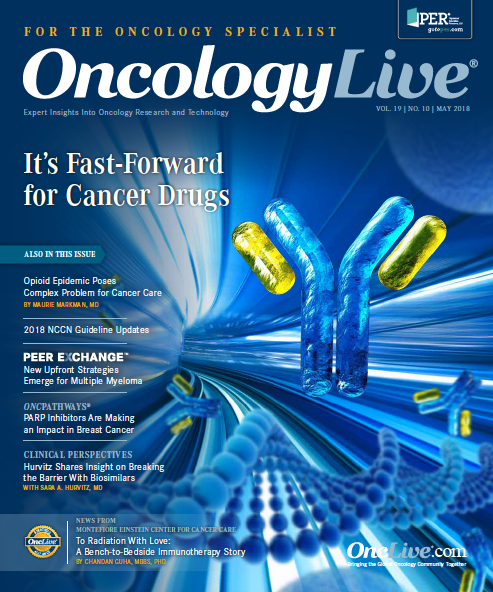Publication
Article
Oncology Live®
Expert Panel Says Evidence Does Not Yet Support Most ctDNA Testing Outside of Clinical Trials
Author(s):
There is very little evidence of clinical validity or clinical utility to justify the widespread use of circulating tumor DNA assays in most patients with advanced cancer, according to a panel of experts from ASCO and the College of American Pathologists
Daniel Hayes, MD

Daniel Hayes, MD
Despite the "extremely high level of current enthusiasm” for circulating tumor DNA (ctDNA) testing, there is very little evidence of clinical validity or clinical utility to justify the widespread use of ctDNA assays in most patients with advanced cancer, according to a panel of experts from the American Society of Clinical Oncology and the College of American Pathologists who reviewed studies representing over a decade of clinical research.1
The panel made an exception for assays that have demonstrated clinical utility or gained regulatory approval, but noted that the rapid uptake of ctDNA testing calls for “robust” research to clarify how ctDNA assays should be used and develop guidelines.
In addition, the panel found that “there is no evidence of clinical utility and little evidence of clinical validity of ctDNA assays in earlystage cancer, treatment monitoring, or residual disease detection,” and no evidence exists to support the use of ctDNA tests for cancer screening “outside of a clinical trial.”
The findings were based on review of 77 articles published from January 2007 to March 2017 on the use of ctDNA assays for solid tumors. Liquid biopsies have caused excitement because they offer a minimally invasive means of testing for the presence of cell-free tumor DNA in the bloodstream, and results are not confined to a particular tumor site. In addition, these tests hold the promise of allowing frequent sample taking with comparatively less adverse effect on patients than tissue sampling, which is often impaired by insufficient biomatter or poor quality of sample tissue.
However, ctDNA assays do not approach the reliability of actual tissue sampling, according to the panel, so negative liquid biopsy results should be confirmed with tumor-tissue genotyping. “Evidence shows discordance between the results of ctDNA assays and genotyping tumor specimens and supports tumor tissue genotyping to confirm undetected results from ctDNA tests,” the panel wrote.
“Like all new things in medicine, the use of ctDNA assays in routine cancer care requires evidence of clinical utility,” panel member Daniel F. Hayes, MD, said.2 “At present, there is insufficient evidence of clinical validity and utility for the majority of ctDNA assays in advanced cancer, including those that interrogate a panel of genes.” Hayes serves as the clinical director of the Breast Oncology Program at the University of Michigan Comprehensive Cancer Center in Ann Arbor.
Table. Key Findings from ASCO/CAP Panel
The panel also noted that the most reliable ctDNA results are obtained at the time of disease progression, not when a patient responds to prior therapy, and that no evidence suggests that ctDNA is useful in monitoring therapy effectiveness. Further, the amount of ctDNA relative to cell-free DNA varies substantially between patients, affecting the prognostic value of these tests (Table).Panelists found that establishing the clinical utility of ctDNA assays is challenging because of the lack of prospective trial data compared with available research on standard biopsies for tumor genotyping. At present, just the cobas EGFR Mutation Test v2 for non—small cell lung cancer (NSCLC) has demonstrated sufficient clinical utility to gain FDA approval. Polymerase chain reaction–based ctDNA assays for EGFR in NSCLC and KRAS in colorectal cancer are available for commercial use in Europe, but— as was the case for cobas—their clinical utility was established using retrospective analysis.
There is limited evidence of clinical validity of ctDNA analysis in other tumor types and for variants that were not analyzed as part of the ctDNA studies for EGFR in lung cancer and KRAS in colorectal cancer. A wide range of ctDNA assays have been developed and clinically studied for detection of potentially targetable variants, such as BRAF variants in melanoma and PIK3CA and ESR1 variants in breast cancer. Although several liquid biopsy tests are commercially available, their clinical utility has not been established.
“There is very significant potential for many different applications of ctDNA tests in the future,” Jason D. Merker, MD, PhD, said in a statement. “However, we need to make sure that we develop the body of evidence as part of clinical trials to support these applications in various tumor types. This is critical to ensure that we are providing the best care for our patients.” Merker is an assistant professor of pathology at the Stanford University Medical Center in California and served as cochair of the panel.
Because liquid biopsy can identify ctDNA in early-stage disease, there is great interest in the potential for using ctDNA to detect cancer in asymptomatic individuals and populations. However, the panel concluded that the risk of false-positive results, both technical and biologic, has not been established.
The panel believes that clarity on the clinical validity and utility of ctDNA assays will emerge. “What is promising is that this area of research is rapidly evolving, so there should be enough evidence soon to formulate evidence-based guidance for a variety of clinical scenarios,” Hayes said.
References
- Merker JD, Oxnard GR, Compton C, et al. Circulating tumor DNA analysis in patients with cancer: American Society of Clinical Oncology and College of American Pathologists joint review [published online March 5, 2018]. J Clin Oncol. doi: 10.1200/JCO.2017.76.8671.
- Liquid biopsy tests in people with cancer: an expert review [press release]. Alexandra, VA: American Society of Clinical Oncology and College of American Pathologists; March 1, 2018. asco.org/about-asco/press-center/ news-releases/liquid-biopsy-tests-people-cancer-expert-review. Accessed May 1, 2018.









